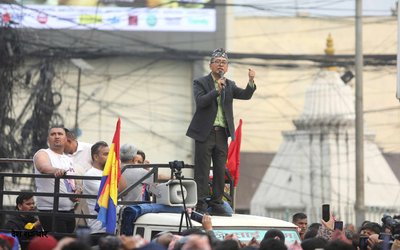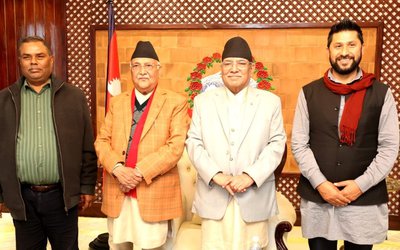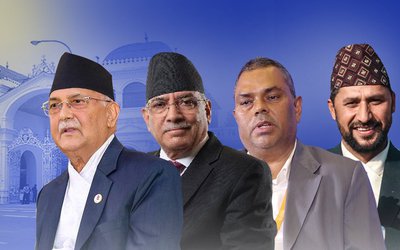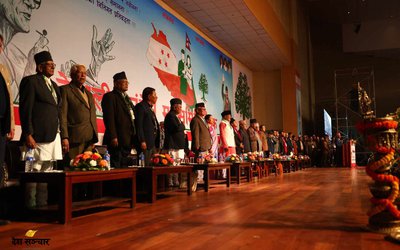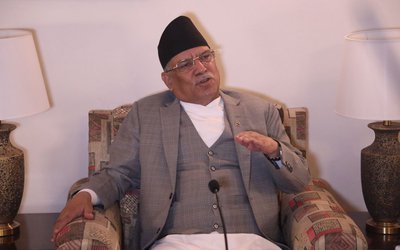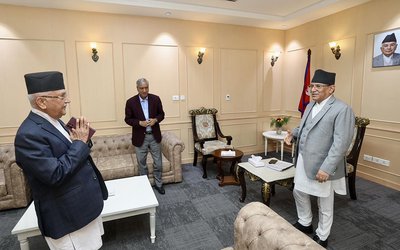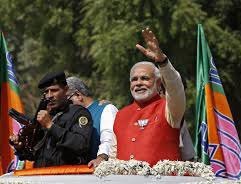
Following the results of the elections in India last week, speculations have been rife in Nepal about the impact of the resounding victory of the rightwing Bharatiya Janata Party under its three-time flamboyant Gujarat chief minister Narendra Modi.
Reams of paper have been spent on analysing the possible impact of the installation of a Modi-led BJP government on Nepali politics. There has been a deluge of words on the implications of a government of what the western media calls the Hindu nationalists for the long-running political transition of a once-Hindu kingdom.
Will the famous business-friendly leader's ascension to the seat of power in the centre, after a remarkable 'growth' innings in his home state of Gujarat, be conducive to fuel the engine of growth in the neighbouring Nepal too? Will the saffron outfit's undisputed star performer take any special interest in the revival of a Hindu state in the land of Pashupatinath as claimed by the president of the Vishwa Hindu Parishad, Ashok Singhal who recently said in Biratnagar that " Nepal will turn into a Hindu state if Narendra Modi becomes India's Prime Minister."? Will Modi by any chance go one step further and toy with the idea of the utility of the discarded Hindu monarchy as well?
Will the debate over the form of federalism and the system of governance to be incorporated in the new constitution debate remain immune to the change of guards in the capital whose signature carries the 12-point agreement between Nepal's mainstream political parties and the erstwhile communist rebels? Will the Nepali actors be able to carry "the letter and the spirit" of the Delhi Agreement now that the resident of the 7 Race Course has changed?
There are no easy or straight answers. But what is important to note is that in international relations it is not the sentiments, emotions, personal preferences nor for that matter any ideology and political system that matter. It is national interest that does. National interests do dictate the relations between the countries. Nepal and India are no exception.
Nepal has not been able to even define what exactly its interests are especially vis-a-vis relations with India as key internal actors always sought to look at what and how winds are blowing across the border. But there has been a consistency in India's policy towards Nepal since the country won independence from the British more than sixty years ago. National security considerations have always been in top priority for India vis-a-vis its relations with Nepal. India's security concerns in its small neighbour, Nepal, concern the mighty neighbour, China.
So, what will be the Modi effect on Nepal-India relations will largely depend on the kind of relations the two giants will have in the changed context. Coincidentally, the change of guards in Delhi has taken place a year after a change in Beijing -- the former through election the latter by selection.
India-China understanding or lack of it on the two countries' sandwiched neighbour will be crucial to gauge the impact of the Modi victory on Nepal notwithstanding the incoming Indian PM's aggressive Hindutwa and nationalistic postures.
In terms of containing the western presence and influence in their backwards amidst the lingering instability, India and China may see a common stake in Nepal. The prolonged instability and the uncertain future and the rise of the western presence in the aftermath of the Jana Aandolan-2 has been a cause of concern for both India and China. A convergence of interests of the two could lay ground for a totally different political course for Nepal.
As chief minister Modi has visited China four times. In 2011, he was accorded a welcome generally reserved for heads of state. The man who is about to become head of government now carried red visiting cards printed in Chinese. In doing so the saffron-brigade carrier was put business in the front seat pushing ideology and religion to the backseat.
Wrote Debasish Roy Chowdhury wrote in South China Morning Post (May 17), "Over the years, China and Modi have invested heavily in each other and forged a bond that could have far-reaching ramifications not only for Sino-Indian relations, but also for the US "Asia pivot" strategy.."
- Ukrainian Crisis And The World (Dis)Order
- Apr 22, 2022
- China’s Cautious Steps In The Graveyard Of Empires
- Aug 18, 2021
- Foreign Aid On The Fence!
- Aug 08, 2021
- Communist Party of China centenary celebrations Reading between the lips
- Jul 14, 2021
- Second Wave Of Covid-19 In India: Deadly Blow To The Economy
- Jun 23, 2021


